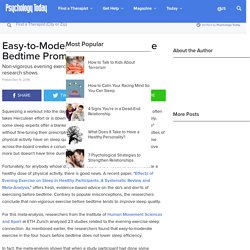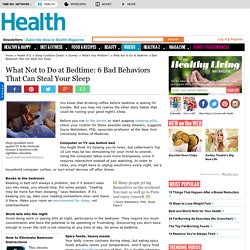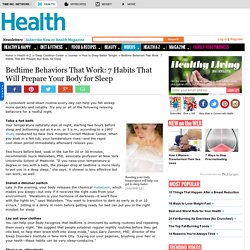

Easy-to-Moderate Exercise Before Bedtime Promotes Deep Sleep. Squeezing a workout into the daytime hours of a jam-packed weekly schedule often takes Herculean effort or is downright impossible for many people.

Unfortunately, some sleep experts offer a blanket recommendation to "avoid evening exercise" without fine-tuning their prescriptive advice based on the impact various intensities of physical activity have on sleep quality and insomnia. Prohibiting evening exercise across-the-board creates a conundrum for anyone who wants to sit less and move more but doesn't have time during the day to work out. Fortunately, for anybody whose daytime schedule is too hectic to accommodate a healthy dose of physical activity, there is good news. A recent paper, "Effects of Evening Exercise on Sleep in Healthy Participants: A Systematic Review and Meta-Analysis," offers fresh, evidence-based advice on the do's and don'ts of exercising before bedtime.
6 Bad Behaviors That Can Steal Your Sleep. Sleep specialists warn against TV in the bedroom because it interferes with nighttime relaxation.

You know that drinking coffee before bedtime is asking for trouble. But you may not realize the other daily habits that could be ruining your good night's sleep. Before you run to the doctor or start popping sleeping pills, check your routine for these possible sleep stealers, suggests Joyce Walsleben, PhD, associate professor at the New York University School of Medicine. Computer or TV use before bed You might think it's helping you to relax, but Letterman's Top 10 List may be too stimulating for your mind to unwind.
Using the computer takes even more brainpower, since it requires interaction instead of just watching. Books in the bedroom Many people jet lag themselves on the weekend. What Happens When You Want to Go to Bed Early but You Actually Don’t Do It. We can also have doubts about how it’s possible that these people to be so productive.

I want to show you in this article the other side of the effort that these successful people make (that you can replicate too, if you want) to wake up early. Most of them get enough sleep to be well rested. Here you have the times when some of these successful people go to bed: Arianna Huffington: 10 pm.Jack D’Orsey: 10:30 pm.Tim Cook: 9:30 pm.Benjamin Franklin: 10 pm.Thomas Edison: 11 pm.Jeff Bezos: 10 pm.Ellen Degeneres: 11 pm. Every change in our sleep habits in our transition towards becoming an early riser starts with going to bed earlier. That’s the key. This is a habit that requires some effort in order to be changed; it’s not an easy one. My opinion is that it has to do a lot with the “decision fatigue”. This power decreases during the day, and it goes down even faster if we spend a day in a bad mood, we are tired or feel demotivated.
7 Reasons Productive People Go to Bed Early. 10 Things to Do Before You Go to Bed. Everyone is obsessed with how successful people start their day.

And if you’ve decided to do something about the quality of your life, you’ll start working on developing a morning routine and trying different versions of it. But we seem to forget that what productive people – those who work each day to achieve what they want and have hacked so many areas of their life – do before they go to bed is as important. The evening routine is one of the most underestimated habits, and yet an absolute must when it comes down to changing how your day goes and whether you want to get stuff done. A nighttime ritual affects your sleep and the mood you’ll be in when you get up, and thus becomes the foundation of your whole day. What You Do Right Before Bed Determines How Productive and Focused You’ll Be Tomorrow. I have written and talked a lot about how the right morning routine can set you up for a productive day.

The same is true for nighttime rituals. The right activities before you sleep can set you up for success the next day. Courtesy of iStock/SandraKavas I used to have the worst time getting to sleep at night. I knew it was important for my health and productivity, but my mind raced long after the lights went out. As a result, I woke up groggy, grumpy, and ill-prepared for the day. Eventually, my doctor suggested Ambien. Today, I am happy to report that I sleep like a baby—without the help of Ambien or any other drug.
These nine activities make up my nighttime ritual: Eliminate negative input. Without good sleep, I find myself unfocused, fatigued, less creative, less resilient, short-tempered, and unproductive. Some of these nine activities may work for you; some of them may not. If you do, you’ll probably discover you’re more rested, creative, energetic, and productive the next day. 7 Habits That Will Prepare Your Body for Sleep. Boosting your body temperature will help you get to sleep faster.

A consistent wind-down routine every day can help you fall asleep more quickly and reliably. Try any or all of the following relaxing behaviors for a restful night. Take a hot bath Your temperature naturally dips at night, starting two hours before sleep and bottoming out at 4 a.m. or 5 a.m., according to a 1997 study conducted by New York Hospital-Cornell Medical Center. When you soak in a hot tub, your temperature rises—and the rapid cool-down period immediately afterward relaxes you. Two hours before bed, soak in the tub for 20 or 30 minutes, recommends Joyce Walsleben, PhD, associate professor at New York University School of Medicine. Install a dimmer switch Late in the evening, your body releases the chemical melatonin, which makes you sleepy—but only if it receives the right cues from your environment. How Can I Fall Asleep Faster? Eat right, sleep tight.